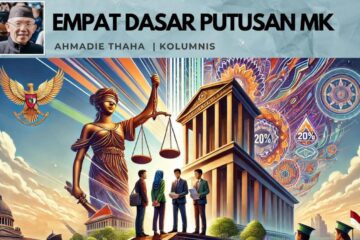
By Imam Shamsi Ali
I OFTEN emphasize that the most intense warfare in today’s information era is the battle of images and perceptions. This warfare aims to shape public opinion on a particular issue. Ultimately, the issue will be defined by the opinions formed based on the cultivated images and perceptions.
The role of mass media, including social media, is significant in building these images and perceptions. Mass media can tarnish the reputation of the innocent and clear the name of the guilty, depending on the desired image and perception.
The complexity of mass media often leads to dishonesty in reporting information. A classic example illustrates this point: “A dog biting a man is not news, but a man biting a dog is.”
Recently, we have been reminded of this reality. Almost all mass media outlets, particularly those in regions claiming to uphold honesty and civilization, have been guilty of at least one of the following:
1. Spreading false information (fake news): Reporting untrue events or fabricating stories. For instance, CNN later retracted reports of Palestinian fighters killing Israeli children and raping Israeli women.
2. Sensationalizing negative events: Amplifying tragic events affecting one party while downplaying or hiding similar events affecting the other party. The killing of Israeli children received extensive coverage, whereas the massacre of Palestinian children was largely ignored by Western media.
3. Reversing facts: Framing the guilty party as innocent and vice versa. The Palestinian struggle for independence is portrayed as terrorism, while Israel’s killing of civilians is justified as self-defense.
The Importance of Taking a Stance
What I want to emphasize is the importance of taking a stance in this conflict. Remaining neutral, especially when values and lives are at stake, is deeply questionable and may indicate uncertainty or even hypocrisy.
When taking a stance, individuals typically have their reasons or motivations. A person with a clear mind and conscience will not base their stance solely on emotional or sentimental grounds, nor on self-interest. Instead, their stance will be guided by noble values, whether from a religious or humanitarian perspective.
The Israeli-Palestinian issue is a matter of colonization and oppression, where one party’s basic rights are violated by another. When discussing colonization and oppression, we are talking about freedom and justice – core values in both religious and humanitarian contexts.
In Islam, colonization is seen as the antithesis of faith in the oneness of God (Tawhid). Therefore, believing in Tawhid necessitates resistance to colonization, regardless of the perpetrator or victim.
From a humanitarian perspective, colonization violates fundamental human rights. Moreover, both Islamic and humanitarian values emphasize the importance of solidarity and brotherhood.
Islam stresses the need to maintain both Islamic brotherhood (ukhuwah Islamiyah) and human brotherhood (ukhuwah basyariyah). Part of this involves building solidarity with fellow human beings.
Therefore, supporting the oppressed nation in this conflict is not only valid but also obligatory, both from a religious and humanitarian standpoint.
If you are a Muslim, and more importantly, a human being, there is no reason not to support Palestine. Even if you are not a Muslim, but still a human being, there is no justification for not supporting Palestine.
Unfortunately, the influence of media in shaping public opinion and the hypocrisy of the international community have led many people to lose their moral compass. As a result, the truth is distorted, the victims of oppression turn evil and the evil oppressors are portrayed as victims.
May Allah guide us.*
NYC Subway, 24 January 2025
Director Jamaica Muslim Center/President, Nusantara Foundation USA



